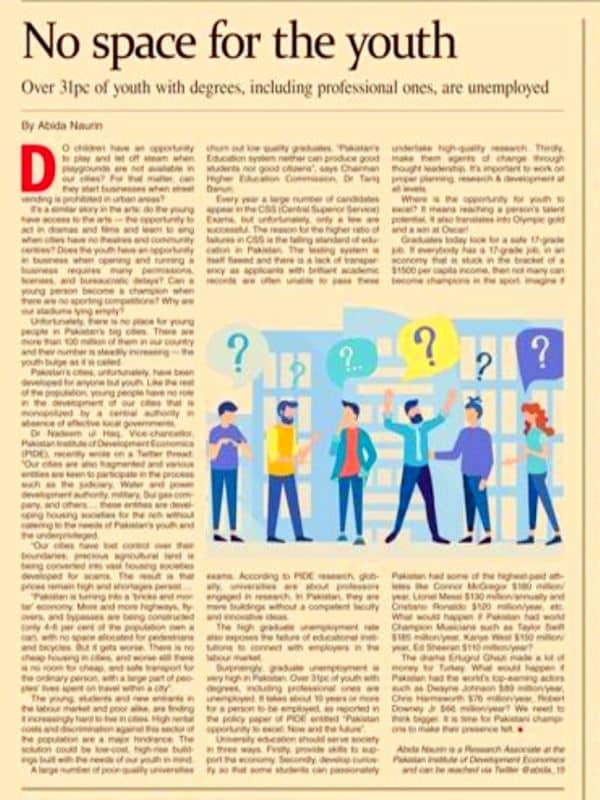
Pakistan Institute of Development Economics
- Home
Our Portals
MenuMenuMenuMenuMenuMenuMenu - ResearchMenuMenuMenuMenuMenuMenuMenu
- Discourse
- The PDR
- Our Researchers
- Academics
- Degree Verification
- Thesis Portal
- Our Portals
No space for the youth
Do children have an opportunity to play and let off steam when playgrounds are not available in our cities? For that matter, can they start businesses when street vending is prohibited in urban areas?
It’s a similar story in the arts: do the young have access to the arts — the opportunity to act in dramas and films and learn to sing when cities have no theatres and community centres? Does the youth have an opportunity in business when opening and running a business requires many permissions, licenses, and bureaucratic delays? Can a young person become a champion when there are no sporting competitions? Why are our stadiums lying empty?
Unfortunately, there is no place for young people in Pakistan’s big cities. There are more than 100 million of them in our country and their number is steadily increasing — the youth bulge as it is called.
Pakistan’s cities, unfortunately, have been developed for anyone but youth. Like the rest of the population, young people have no role in the development of our cities that is monopolized by a central authority in absence of effective local governments.
Dr Nadeem ul Haq, Vice-chancellor, Pakistan Institute of Development Economics (PIDE), recently wrote on a Twitter thread: “Our cities are also fragmented and various entities are keen to participate in the process such as the judiciary, Water and power development authority, military, Sui gas company, and others…. these entities are developing housing societies for the rich without catering to the needs of Pakistan’s youth and the underprivileged.
Over 31pc of youth with degrees, including professional ones, are unemployed
“Our cities have lost control over their boundaries; precious agricultural land is being converted into vast housing societies developed for scams. The result is that prices remain high and shortages persist….
“Pakistan is turning into a ‘bricks and mortar’ economy. More and more highways, flyovers, and bypasses are being constructed (only 4-6 per cent of the population own a car), with no space allocated for pedestrians and bicycles. But it gets worse. There is no cheap housing in cities, and worse still there is no room for cheap, and safe transport for the ordinary person, with a large part of peoples’ lives spent on travel within a city”.
The young, students and new entrants in the labour market and poor alike, are finding it increasingly hard to live in cities. High rental costs and discrimination against this sector of the population are a major hindrance. The solution could be low-cost, high-rise buildings built with the needs of our youth in mind.
A large number of poor-quality universities churn out low quality graduates. “Pakistan’s Education system neither can produce good students nor good citizens”, says Chairman Higher Education Commission, Dr Tariq Banuri.
Every year a large number of candidates appear in the CSS (Central Superior Service) Exams, but unfortunately, only a few are successful. The reason for the higher ratio of failures in CSS is the falling standard of education in Pakistan. The testing system is itself flawed and there is a lack of transparency as applicants with brilliant academic records are often unable to pass these exams. According to PIDE research, globally, universities are about professors engaged in research. In Pakistan, they are mere buildings without a competent faculty and innovative ideas.
The high graduate unemployment rate also exposes the failure of educational institutions to connect with employers in the labour market.
Surprisingly, graduate unemployment is very high in Pakistan. Over 31pc of youth with degrees, including professional ones are unemployed. It takes about 10 years or more for a person to be employed, as reported in the policy paper of PIDE entitled “Pakistan opportunity to excel: Now and the future”.
University education should serve society in three ways. Firstly, provide skills to support the economy. Secondly, develop curiosity so that some students can passionately undertake high-quality research. Thirdly, make them agents of change through thought leadership. It’s important to work on proper planning, research & development at all levels.
Where is the opportunity for youth to excel? It means reaching a person’s talent potential. It also translates into Olympic gold and a win at Oscar!
Graduates today look for a safe 17-grade job. If everybody has a 17-grade job, in an economy that is stuck in the bracket of a $1500 per capita income, then not many can become champions in the sport. Imagine if Pakistan had some of the highest-paid athletes like Connor McGregor $180 million/year, Lionel Messi $130 million/annually and Cristiano Ronaldo $120 million/year, etc. What would happen if Pakistan had world Champion Musicians such as Taylor Swift $185 million/year, Kanye West $150 million/year, Ed Sheeran $110 million/year?
The drama Ertugrul Ghazi made a lot of money for Turkey. What would happen if Pakistan had the world’s top-earning actors such as Dwayne Johnson $89 million/year, Chris Harmsworth $76 million/year, Robert Downey Jr $66 million/year? We need to think bigger. It is time for Pakistani champions to make their presence felt.
Abida Naurin is a Research Associate at the Pakistan Institute of Development Economics and can be reached via Twitter @abida_15
Published in Dawn, The Business and Finance Weekly, March 14th, 2022



